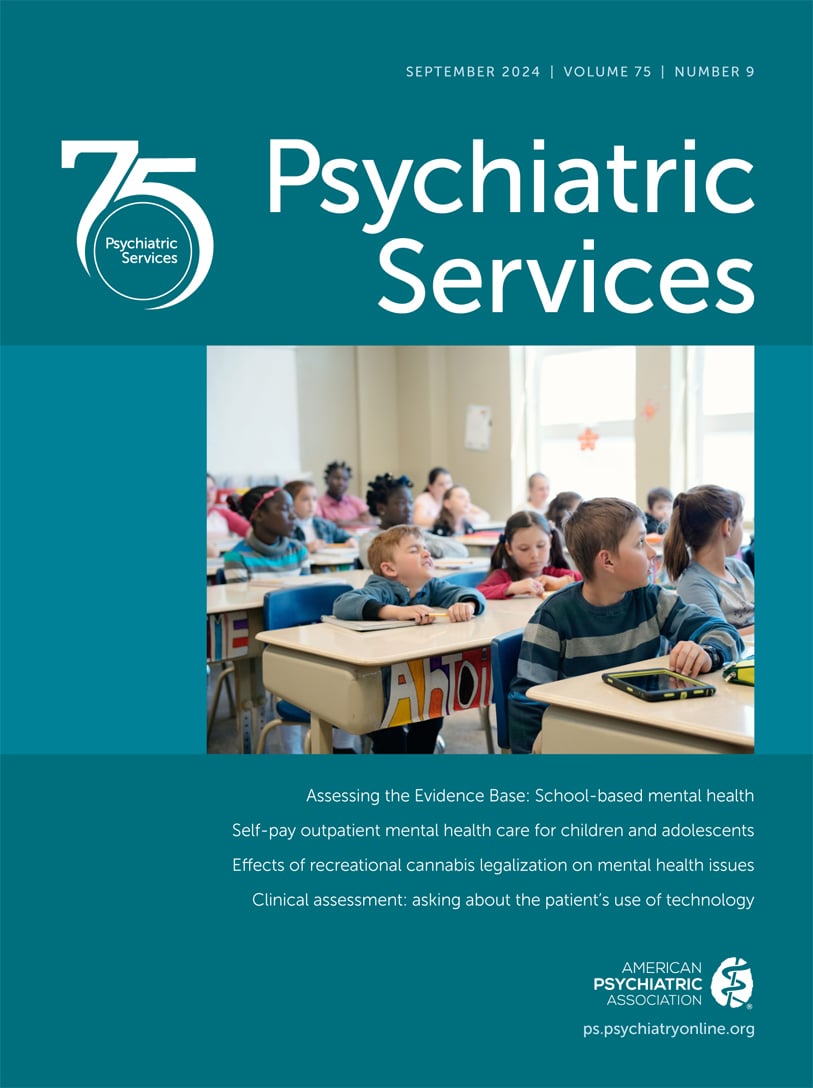Psychiatric Services
- Volume 73
- Number 9
- September 2022
Taking Issue
Viewpoint
Articles
Publication date: 31 March 2022
Pages965–969Objective: In this study, the authors sought to examine the impact of socioeconomic variables on outcomes of pharmacotherapy treatments for major depressive disorder in analyses that controlled for treatment access and level of care. Methods: The authors ...
https://doi.org/10.1176/appi.ps.202100559Publication date: 23 February 2022
Pages970–977Objective: Programs for early intervention in psychosis have shown clinical efficacy. The authors aimed to evaluate the cost-effectiveness of early intervention programs compared with standard care for the treatment of first-episode psychosis in the United ...
https://doi.org/10.1176/appi.ps.202100161Publication date: 23 February 2022
Pages978–983Objective: U.S. military service members, veterans, and their families increasingly seek care from providers with limited knowledge of military culture. The 16-item core DSM-5 Cultural Formulation Interview (CFI) was designed to integrate cultural factors ...
https://doi.org/10.1176/appi.ps.202100523Publication date: 13 April 2022
Pages984–990White veterans referred to a collaborative care program were almost twice as likely as Black veterans to receive an antidepressant prescription. Notably, Black patients had significantly higher severity of depression symptoms, and more Black patients had ...
https://doi.org/10.1176/appi.ps.202100237Publication date: 23 February 2022
Pages991–998Objective: Little is known about recent trends in treatment for alcohol use disorder. The authors used national data to examine treatment trends among individuals with alcohol use disorder. Methods: A sample of nonelderly adults (ages 18–64 years, N=36,707) ...
https://doi.org/10.1176/appi.ps.202000323Publication date: 16 March 2022
Pages999–1004Objective: When clients do not seem to be improving, mental health workers have more negative job attitudes, experience higher levels of client-related burnout, and are more interested in leaving the field. Nonetheless, it is unclear whether all mental ...
https://doi.org/10.1176/appi.ps.202100468Publication date: 17 February 2022
Pages1005–1012Objective: Online resources represent an important avenue to identify and support individuals who may be experiencing symptoms of psychosis but have yet to engage in care. Understanding the experiences and needs of this group is critical to inform outreach ...
https://doi.org/10.1176/appi.ps.202100257Publication date: 16 March 2022
Pages1013–1018Objective: Electronic health records (EHRs) are used for both clinical practice and research. Because mental health service users’ views are underrepresented in perspectives on EHR use, the authors examined service users’ awareness, attitudes, and opinions ...
https://doi.org/10.1176/appi.ps.202100477Publication date: 23 March 2022
Pages1019–1026Objective: The study estimated balance billing for out-of-network behavioral health claims and described subscriber characteristics associated with higher billing. Methods: Claims data (2011–2014) from a national managed behavioral health organization’s ...
https://doi.org/10.1176/appi.ps.202100157Special Articles
Publication date: 17 February 2022
Pages1027–1038Objective: Virtual Reality Job Interview Training (VR-JIT) is a computerized interview simulator with efficacy at enhancing interview skills and employment outcomes. A randomized controlled trial assessed VR-JIT effectiveness for participants in individual ...
https://doi.org/10.1176/appi.ps.202100516Publication date: 17 February 2022
Pages1039–1046Objective: Although implementation science has taken hold in many areas of psychiatric services research, a need remains for developing effective, low-cost interventions for specific subpopulations with mental health conditions. The experimental ...
https://doi.org/10.1176/appi.ps.202100202Brief Reports
Publication date: 23 March 2022
Pages1047–1050Objective: This study sought to identify current practices for the treatment of patients presenting with suicidal ideation or a recent suicide attempt in pediatric emergency departments (EDs) in North America. Methods: From October 10, 2018, to January 19, ...
https://doi.org/10.1176/appi.ps.202100206Publication date: 05 April 2022
Pages1051–1055Objective: A manualized single-session positive psychotherapy intervention was developed and tested on acute psychiatric wards. Methods: Participants were invited in 2018–2019 to identify positive experiences, link them to a personal character strength, and ...
https://doi.org/10.1176/appi.ps.202100316Personal Accounts
Racism & Mental Health Equity
Publication date: 13 April 2022
Pages1061–1064The scarcity of bilingual psychiatrists, as well as appropriate mental health services for populations with limited English proficiency, has led to inequitable health outcomes. A fellowship program was developed, which draws from a clinical model staffed ...
https://doi.org/10.1176/appi.ps.202100220Publication date: 16 March 2022
Pages1065–1068Families and caregivers play a critical role in the recovery of their loved ones with schizophrenia. Early intervention services, including family psychoeducation, can improve clinical outcomes and reduce stress for caregivers. Despite the benefits of ...
https://doi.org/10.1176/appi.ps.202100459Technology in Mental Health
Publication date: 16 March 2022
Pages1069–1072Lesbian, gay, bisexual, transgender, queer, plus (LGBTQ+) youths face increased risk for psychiatric morbidity, and the stress of being in a minority group drives this disparity. Affirmative treatments can improve mental health among LGBTQ+ youths, but ...
https://doi.org/10.1176/appi.ps.202100569Global Mental Health Reforms
Publication date: 17 February 2022
Pages1073–1076The collaborative care model (CoCM) is a strategy of integrating behavioral health into primary care to expand access to high-quality mental health services in areas with few psychiatrists. CoCM is multifaceted, and its implementation is accelerating in ...
https://doi.org/10.1176/appi.ps.202100421Lived Experience Inclusion & Leadership
Publication date: 17 February 2022
Pages1077–1080The authors of this column describe and reflect on challenges and successes encountered during implementation of a participatory research collaborative focused on the pathways to mental health care for youths and young adults. The collaborative centered ...
https://doi.org/10.1176/appi.ps.202100567Past Issues
View Issues Archive
Vol. 75 | No. 12

Vol. 75 | No. 11

Vol. 75 | No. 10
